Buzz Is A Baby Boomer In 'Lightyear,' And It's Actually So Cathartic To Watch Him Learn To Accept Imperfection
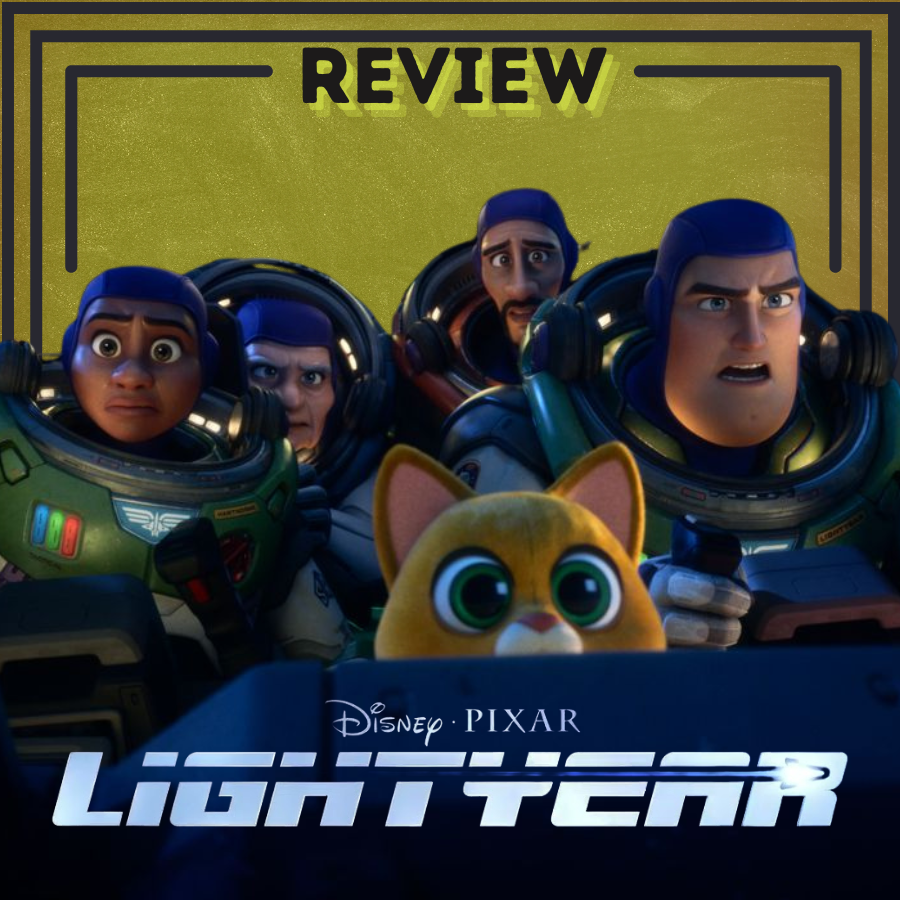
I don't know what those early critics were on about, because frankly, I thought Lightyear was a delight.
Was it the same kind of tear-jerking story we've come to expect from Pixar? No, but it was never supposed to be. (We literally just got Turning Red, a film that made me sob like a baby with a single line at the end. I'm okay with some dry eyes on this one.) This film did, however, feel like it could have been Andy's favorite movie.
It was a fun story, with elements from some of our favorite blockbusters - Star Trek, Star Wars, Guardians of the Galaxy - there were even a couple of very direct Top Gun parallels. It was heavy on action without losing out on heart, and the characters were flawed only in ways that made you want to root for them all the more. (I would die for Sox.)
(Also, the references to the original Toy Story movies were very sweet - and Chris Evans does an UNCANNY Tim Allen impression.)
More importantly, however, I loved Lightyear's central message, which appeared to me to be a barely-veiled critique at aging Baby Boomers to pass the buck and let the next generation have a turn in the driver's seat.
Yup - Buzz Is A Baby Boomer
Yes, of course, the story of Buzz Lightyear of Star Command is set a long time ahead in a galaxy far, far away, but within the context of the story it's easy to see that Buzz is meant to be analagous to a Boomer. He's a spaceman who was among the first to explore a new planet. He's also got a work ethic and a sense of duty that makes him put his work ahead of literally everything in his life, no matter the cost.
(He also time travels to the future and meets main characters approximately two to four generations beneath him, which makes the contrast all the more clear.)
We're used to seeing this kind of willingness to sacrifice as a good thing in movies - and it's not bad, but Lightyear shows all the ways in which that sort of duty-bound-savior attitude can make you make foolish, dangerous decisions.
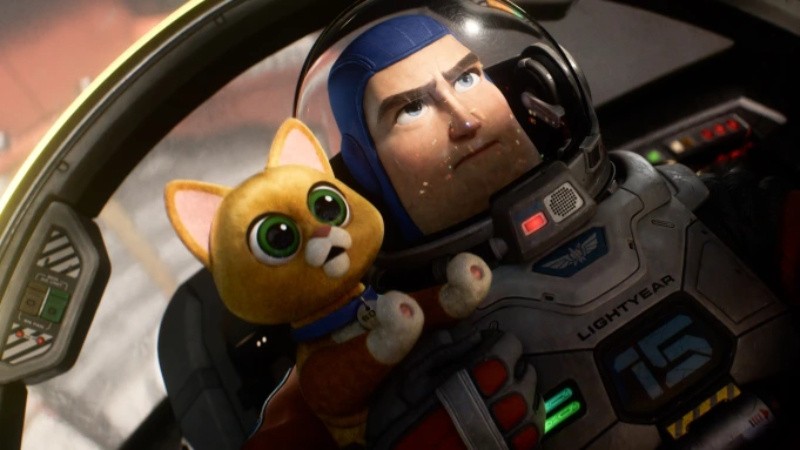
From the beginning, Buzz is framed as an independent, confident man who knows his stuff and doesn't like asking for help - or being asked if he needs any. He's a successful space ranger, but he cringes at being asked to help rookies, preferring to do everything himself, and rely only on his own resources.
But independence isn't always a strength.
This attitude gets Buzz into trouble a few times throughout the movie - in refusing help, he gets himself into a situation that no man - not even one as talented and resourceful as Buzz Lightyear - could get themself out of.
It should be noted that Boomer Buzz is not the brand of obtuse, hateful Boomer we're all used to arguing with about Trump or whatever on the internet. He's a compassionate man who cares so much about the people around them that he will put his life on the line to give them a better one - but he still suffers from the misperception that he is "supposed to be."
Supposed to be some kind of monolith. Supposed to be The Hero. Supposed to do something great enough to end up in history textbooks. Supposed to be greater, greater, greater than he is. (Gee, could this attitude be reflected in the attitudes of the children of a generation literally dubbed "the Greatest Generation??)
Enter Keke Palmer, Taika Waititi, and Dale Soules - Izzy, Mo, and Darby.
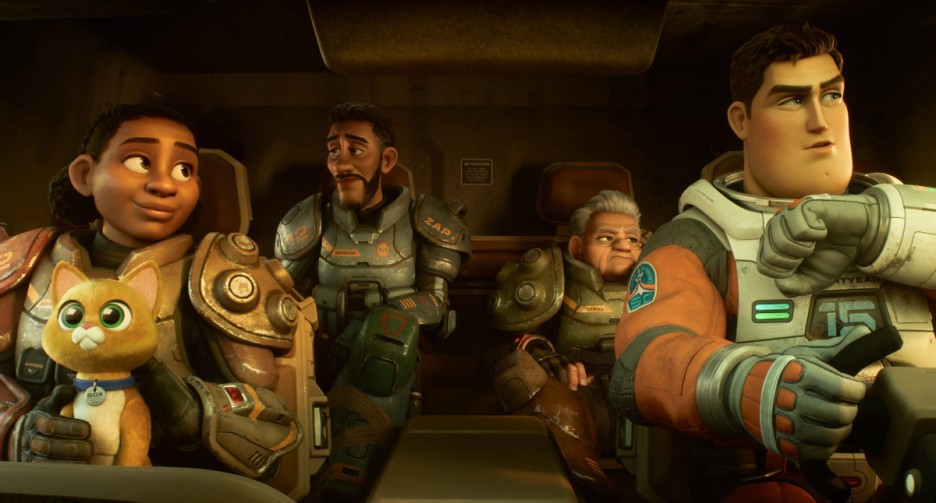
If Buzz is a Boomer, then these guys are the confused representations of the three generations below: Darby is Gen X, as resourceful as Buzz without the hero complex, assuming nobody is really paying attention to her; Mo is a Millennial, woefully underequipped for what he signed up for and confused and insecure the entire time; and Izzy is our Gen Z character, a hopeful, fiery believer who wants to help and lead, but is still afraid of so much.
(Yes, generations are not monoliths, but these ARE three distinct personas that you often see associated with these generations, and that was clearly done on purpose.)
Pixar has been really into having intergenerational conversations lately.
They're not alone - it seems like every movie I watch contains an instance of a parental figure saying something that I desperately wish my parents had said to me as a child, and they're almost all about putting unnecessary pressure on yourself to be perfect.
Buzz blames himself when things go wrong - it's a side effect of being taught that exact mentality, living successful to mission to successful mission with nothing real in between. But Izzy, Mo, and Darby come from a world where things are constantly going wrong - literally all the time - so they know how pointless it is to assign blame the way Buzz does.
Instead of learning how they need to be responsible for their mistakes, as we're used to seeing in children's movies, they have to be the ones to teach a high-strung Buzz:
It's okay when things go wrong. Sometimes nobody is to blame. There's always another solution.
And there truly is - which is what this film is really about. The perfect shot never really seems to pan out in this one - the gun has practice ammo, Buzz misses the throw, the robot notices the bomb - but then the characters use their individual strengths to improvise and find a new solution.
This theme exists on a grander scale in the film as well. Time and time again, they try to explain to us: Sometimes the hidden solution is just to keep on living. Even in the face of everything going wrong, it's still possible to choose to keep on living with what you've got - not to give up, but to at least let yourself rest and have small happinesses.
This theme is made clear when the identity of the villain Zurg (a reveal nearly 23 years in the making) is discovered to actually be a much older Buzz from a different timeline - one who was nearly arrested after his successful hyperspeed run.
(If they had awanted to keep Patricia Heaton from freaking out, they could have had Tim Allen do a cameo here, and it would have worked perfectly. But the fact that it was Thanos' dad also seems weirdly fitting.)
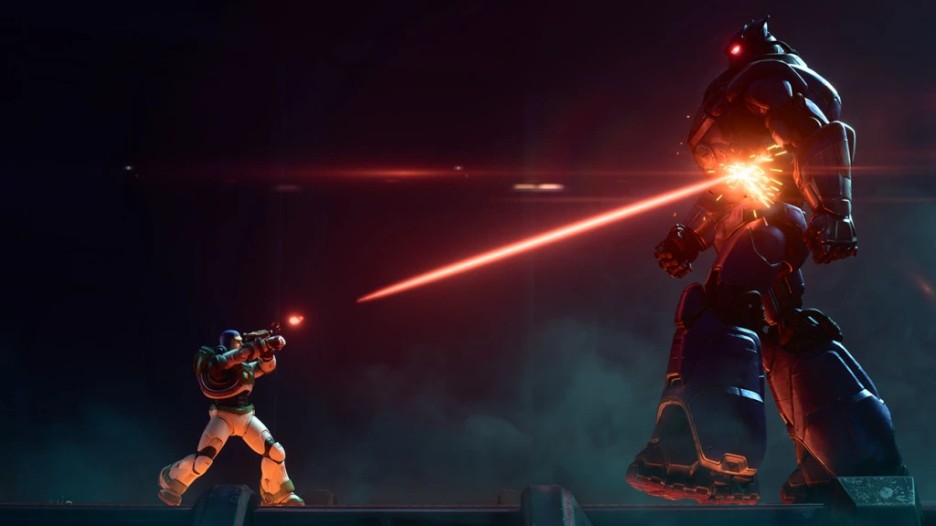
In the clearest illustration of "you either die a hero or live long enough to see yourself become a villain" I've ever seen, we learn that this Buzz dedicated his whole life to going back in time to prevent his initial mistake.
When Our Buzz realizes that if he did this, he'd be erasing the lives of the people he now cares about, it becomes clear:
Only focusing on how to correct your own mistakes is not the hero move you think it is.
Sometimes, the most mature thing to do is move on and try to do better - if you spend all your time focusing on what "should" be happening, you'll miss out on what actually is.
This is what the ragtag team in Lightyear attempts to teach us: Life is messy. It's mistakes. It's not becoming your hero and living a life out of a sanatized storybook, because those don't exist. Nobody achieves anything alone - least of all happiness.
Read also: with her WIFE
Read also: thank you Pixar creatives
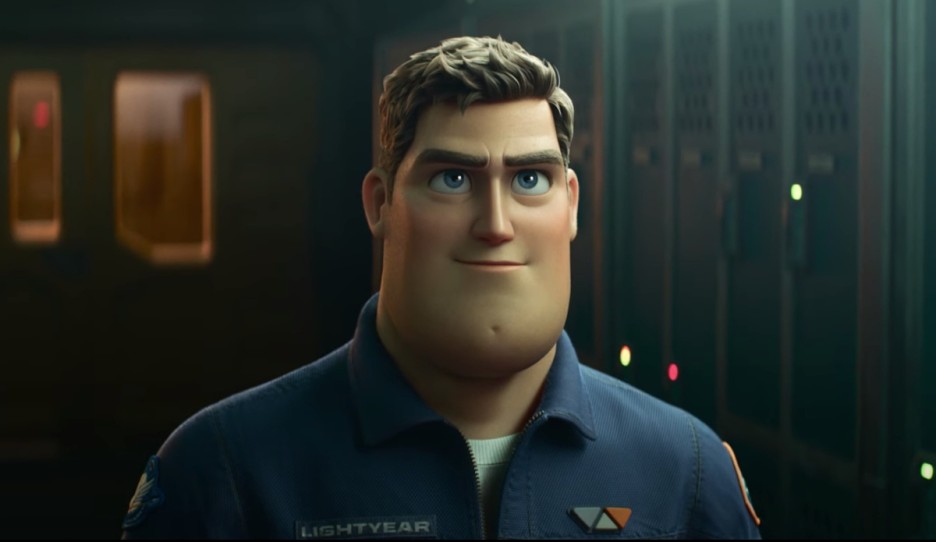
Lightyear is a movie about embracing your shortcomings when you've only been taught to strive for perfection. It's about learning to depend on others when you've been taught it's weak to ask for help. And it's about giving yourself permission to live a life even when it feels like you should only be surviving.
And it's also, importantly, about learning to pass the baton. There are a lot of Boomers - a lot of villain-aged Buzzes - in the driver's seat in our world right now, and many of them may simply think they can't give up because they're not done with their "mission," (the world isn't perfect) and the kids don't know what they're doing.
Buzz doesn't like dealing with rookies, but eventually he realizes it's his duty to teach them - if you want the next generation to know what you know, SOMEONE has to teach them, and if you're in a position to teach and you don't, then you aren't doing your duty.
People who know less than you aren't beneath you, and if you teach them - and LISTEN to them - they can HELP you, and you'll all be stronger for it. Izzy says it best:
"You don't need to save us. You need to join us."
© 2026 Enstarz.com All rights reserved. Do not reproduce without permission.






